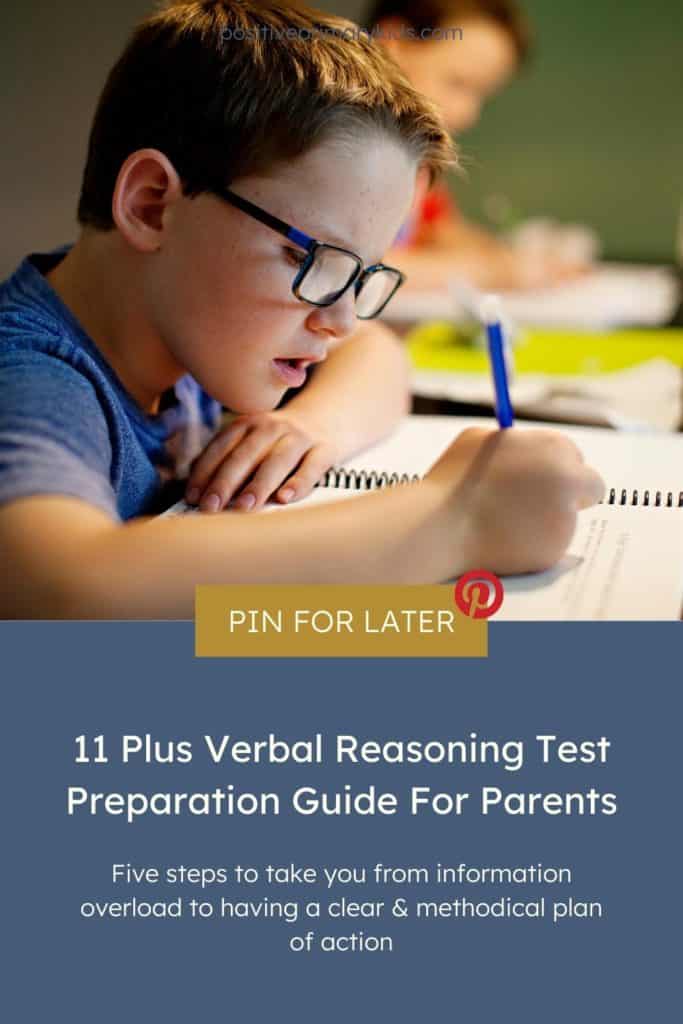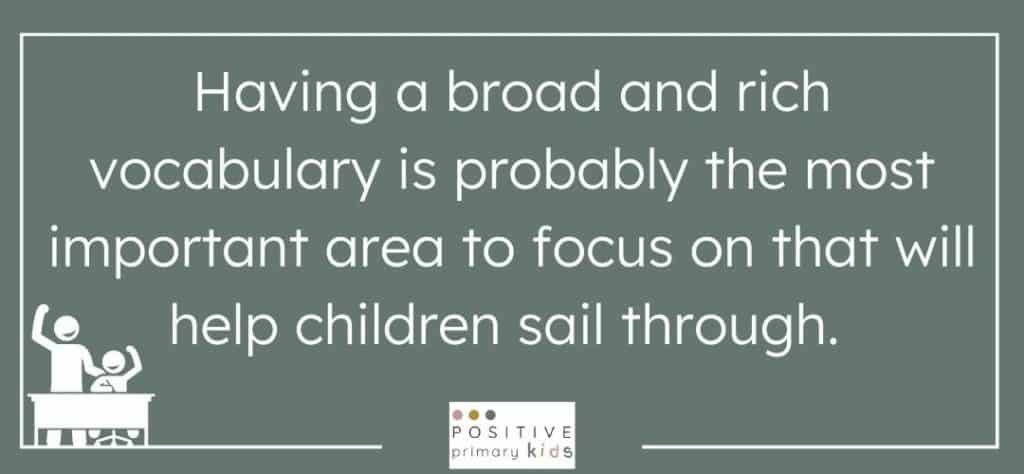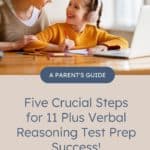So, you’ve decided that you’d like your child to have the option to attend grammar school when they leave primary?
If you are experiencing information overload, I am not surprised! Not to mention the parents in the playground boasting about how they’ve had a tutor for their little one since year 3. Perhaps your subject knowledge is a little rusty… what even is verbal reasoning anyway? Aargh! It’s a LOT to wrap your head around!
Not to worry, I’ve got you! Read on so that you can choose the route that’s right for your family with confidence.
In this post
- Key information for you to find out before you even start preparing
- The skills and knowledge that are needed for verbal reasoning
- How to structure preparation effectively
- What your options are for professional help or DIY test preparation
Affiliate Disclosure: This post may contain affiliate links. This means that I may receive a small commision – at no cost to you – if you make a purchase through these links. Thank you for your support!
Five Steps to 11 Plus Verbal Reasoning Test Prep
Verbal reasoning isn’t a core primary school subject, although some private schools do prepare children for the exam. Because of this, any child with no experience with it will need some degree of preparation. What’s more, it can be the trickiest part of 11 plus exams for some children – and parents!
Selective schools can choose the subjects that they want to include in their exams. For this reason, be aware that verbal reasoning is not in all 11 plus assessments.
In the following five steps, I break down each stage of preparation to help take you from overwhelmed and apprehensive to raring to go.
Step 01 – Find out key 11 plus verbal reasoning test information
Before you even begin prep work, make sure you know what you are preparing for. Last year, I heard a horror story from a mum who spent 18 months preparing her son for the wrong exam board!
The formats and content of exams vary around the country, so do the research well in advance and find out the following:
- Date and location of the exam
- Exam board (GL, CEM or the school’s own)
- Format (multiple-choice, standard answer or combination)
- The subjects that are examined
- Other entry requirements or criteria that individual schools consider in their admissions process (such as catchment area, sibling priority or religion)
You should be able to find all this information through school or local council websites.
Important: If you are planning to apply to more than one school, be sure that you do these steps with each one.
UPDATE
Since September 2023, CEM stopped providing paper-based exams, and although some schools opted to switch to their online exam service, GL has become the main provider of 11+ exams.

Step 02 – Familiarise yourself with the 11 Plus verbal reasoning topics
The exact verbal reasoning topics vary between exam boards – another reason to check the key information mentioned in the previous step.
Having a broad and rich vocabulary is probably the most important area to focus on that will help children sail through. This is true for all exam boards. Be aware that building word knowledge takes time and can’t be shoe-horned in. Ideally, vocabulary is gained naturally through a wide variety of life experiences, conversations, reading widely and routinely and being immersed in a vocabulary-rich environment.
Along with ‘knowing’ lots of words, children need to be able to identify word classes (nouns, verbs, adjectives, adverbs, etc). Also, they need to understand how prefixes and suffixes change root words. A lot of question types also require the ability to spot patterns, manipulate, categorise and sort groups of words.
Verbal reasoning isn’t only about using and applying word knowledge, most exams also require:
- Reliable alphabetical order knowledge for solving letter sequences
- Strong spelling ability
- Solid core maths skills including basic arithmetic, times tables and knowledge of the properties of special numbers, such as prime numbers, factors and cubed numbers
- Code-solving skills using letters or numbers
- The ability to read information and apply logic to reach an answer to a worded problem
For more information on the topics involved in verbal reasoning, take a look at these two posts:
Step 03 – Reinforce the importance of reading for pleasure
- Stronger reading skills and comprehension
- Better grammar
- Stronger writing skills
- Greater memory retention
- Broader vocabulary
- Enhanced general knowledge
- A greater understanding of different cultures and human nature
With digital entertainment increasingly being the norm, carving out time for children to get their teeth into reading daily is more important than ever.
Obviously, pushing kids to read when they don’t want to can be counter-productive. But creating a reading culture in your home can be an effective way to increase time spent reading. So, if you aren’t already a regular reader yourself, consider trying to develop a reading habit – make it the norm for everyone in the family to be reading.
Choose books to read together that would be a little too challenging for them to tackle alone and read to them. No, they are not too old to be read to – even if they are fluent and capable! Besides, there are so many benefits, including:
- Difficult vocabulary can be explained
- Listening to a fluent adult reader provides a great model for reading expressively, enhances meaning and brings life to a story
- You can share longer and more advanced books than they can read alone
- It creates an opportunity for meaningful talk to deepen understanding, discuss characters’ feelings and motivation, make predictions and talk about what you’d do if you were a particular character
- Shared reading creates special, quality time together
Step 04 – Approach verbal reasoning test preparation methodically
There are several ways that you can structure your exam prep. It all depends on your child’s strengths, weaknesses, familiarity with each subject and how much time you have left until the exam.
For this step, I’ll outline a methodical approach that I use with most of my students:
01 – Baseline assessment
Before creating an individual study plan I find out what children already know through informal activities or more standard assessment materials. At home, you could use the tests that come with books, such as the placement tests in The Parents’ Guide to the 11+ by Bond, which you can purchase through Amazon here.
This will give you a good idea of any areas of weakness or unfamiliar topics.
02 – Create a study plan
Again, this depends on the timescale that you are working with, but you need a ‘battle-plan’, of some sort that maps out all of the topics that your child isn’t secure in as well as a timetable for when you plan to work on them.
03 – Get down to learning
Now you know what needs teaching and approximately when you will schedule it. It’s time to learn!
Here’s a step-by-step approach that you can follow for each topic within a subject:
Step 01: Introduce the topic and build familiarity with it by using examples
Step 02: Teach the methods needed to answer questions correctly
Step 03: Explain any common pitfalls to watch out for
Step 04: Practice answering plenty of questions. Work on accuracy first and then speed.
If you are using 11+ workbooks, such as Bond or CGP, they are available as a series at different levels. Start with the books that match your child’s ability rather than the one that matches their age. With these books, there are two routes you could take:
Either: Progress through the books in order.
So, if your child is starting with a year 4 verbal reasoning book, complete the whole book then move on to the year 5 book.
Or: Progress through the books by topic.
So, if your child is starting with a year 4 verbal reasoning book, complete a topic then progress in the topic in the year 5 book followed by the year 6 book.
Regardless of the route you choose, revisit tricky areas regularly so that they stick!
04 – Do practice tests
Children need to learn exam techniques and also have plenty of opportunities to experience a variety of tests to prepare them for exam day. I suggest a mix of short, topic-focused revision tests as well as longer, more authentic practice tests.
Just like with the learning approach, focus on understanding instructions and accuracy first and then develop speed.
An example of a progression through a set of books could look like this:
- Guide book
- Practice book
- 10-minute tests
- Test papers pack
Step 05 – Choose the Right Route for You
Now that you’ve got a feel for the work that needs to be done, you’ve probably got a good idea as to whether a DIY route or tutor support is best for you. Don’t feel pressured by what the parents of your child’s classmates and friends are doing. What suits one family isn’t necessarily going to work for yours.
There are lots of possibilities here, and each comes with various pros and cons. Let’s take a quick look at your main options.
DIY 11 Plus Verbal Reasoning Test Preparation
There are numerous books and online resources that you can use to prepare for the exams at home without having to hire anyone to help.
These materials vary in price, quality and effectiveness. I suggest sticking to well-known names in educational publications like CGP and Bond. Many parents rate First Past the Post books highly. Schofield and Sims publish a range of books that are great for additional practice, but I wouldn’t recommend using them alone.
👍 Pro: DIY exam prep with your child can be a really fun bonding experience! (Really!) ✅
👎 Con: On the other hand, it can be incredibly frustrating to teach your child and keep on top of everything that needs to be done. ❌
Hire a Tutor
DIY 11 plus preparation certainly isn’t for everyone! If you want to take a step back, you may want to consider hiring a tutor. Be aware that hiring a professional doesn’t guarantee that your child will pass. In the majority of cases, additional work will still need to be done at home.
Different types of tuition to consider include:
- Online tuition – I can help you with this!
- In-person tuition (at your home/tutor’s home or office)
- 1-to-1 tuition
- Small group lessons
- Tuition centres
👍 Pros: 1-to-1 tuition provides individual, targeted attention; small groups help develop the competitive nature needed for entry to selective schools; tuition centres can be a great option if you are on a tight budget. ✅
👎 Cons: Tuition can be expensive and not all tutors have relevant experience, skills and qualifications; small groups can be intimidating, especially if there are overbearing personalities in the group; tuition centres don’t necessarily have the resources to ensure that they are meeting each child’s individual needs. ❌
Online Courses
There are many online courses available for general 11 Plus preparation. Two which I’ve seen recommended are from Atom Learning and Learning Street (although I have no experience with them personally).
The structure of online courses varies widely from series of worksheets, to fully automated learning platforms and interactive video courses with opportunities for 1-to-1 support.
👍 Online options can fit in around busy family schedules and are often self-paced, which may suit some children’s learning preferences ✅
👎 Individual support may not be available if children need some extra help ❌
You can learn more to help you choose the best preparation method for you in this post: “Is it smarter to hire a tutor for 11 plus or do DIY prep?“
If you are concerned about the cost of exam preparation, take a look at these five easy money saving tips for prep on a budget.
Now that you’ve got a feel for the work that needs to be done, you’ve probably got a good idea as to whether a DIY route or tutor support is best for you. Don’t feel pressured by what the parents of your child’s classmates and friends are doing. What suits one family isn’t necessarily going to work for yours.
There are lots of possibilities here, and each comes with various pros and cons. Let’s take a quick look at your main options.
- The Impact of Pleasure Reading on Academic Success – The Journal of Multidisciplinary Graduate Research
- Literature Review: The impact of reading for pleasure and empowerment – The Reading Agency
- Children who read books daily score higher in school tests, vast new study states – Institute of Education – University College London
Final thoughts and reminders about verbal reasoning test preparation…
I hope that you now have a good idea of what to expect on the exam preparation journey that lies ahead of you and what your options are?
If it all feels too overwhelming, try not to put it off. Start simply by taking the first step make sure you know the key information – dates, exam board, subjects and format. Then move on to tackling the next step.
Worried that you’ll get things wrong and make mistakes? Take a look at these 25 common 11 Plus Preparation Mistakes.
Should you decide that you would like to hire a tutor, at the time of writing (11 July 2022), I have space available for 1-to-1 online tuition. You can book a free and friendly consultation here if you want to find out more.
I’m also preparing to launch the first in a series of resources and courses to help families with DIY verbal reasoning prep that will be perfect for families looking for a really affordable product. Subscribe to the newsletter to learn more and register your interest.
If you would like any further information or support on this topic, please feel free to leave any questions that you may have in the comments below. I’m always happy to help 🙂









0 Comments